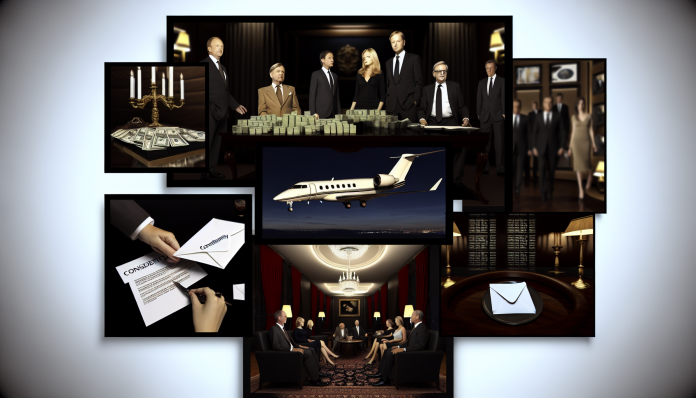Introduction
Franklin Delano Roosevelt, the 32nd President of the United States, is best known for leading the nation through the Great Depression and World War II. However, behind the stoic front and charismatic speeches, there lay a personal life fraught with scandal involving illicit affairs that would surprise even today’s audiences. A significant aspect of this narrative includes secret love letters that have since surfaced, shedding light on Roosevelt’s complicated romantic entanglements, particularly with his distant cousin, Margaret “Missy” Suckley.
This article delves into the intricacies of FDR’s affairs, revealing how they intertwined with societal norms of the early 20th century, as well as examining the shifting moral landscape that informs today’s perspectives on such scandals.
The Scandal
In an era marked by rigid societal expectations surrounding marriage and fidelity, Franklin D. Roosevelt’s extramarital affairs were scandalous. FDR married his distant cousin, Eleanor Roosevelt, in 1905, but their relationship was often described as a partnership marked more by politics than passion. While Eleanor took on significant roles in social welfare and diplomacy, their marriage struggled under the weight of FDR’s personal inclinations.
Key Events and Relationships
Roosevelt’s most notable affair was with Lucy Mercer, Eleanor’s social secretary, which began in 1916. The infidelity was not just a fleeting dalliance; it was a profound relationship that altered the foundations of FDR’s marriage. In 1918, after Eleanor discovered the affair through intimate letters exchanged between the two, she confronted Franklin. FDR, fearing both personal and political repercussions, ended the affair, only to rekindle it years later.
Key Sources and Reactions:
- Eleanor’s anguish was profound, but she chose to continue with the marriage, possibly driven by a desire to maintain political stability. Letters exchanged between her and FDR captured a suffocating balance of love, betrayal, and duty.
- Roosevelt’s inner circle was acutely aware of the affair, yet many chose to remain silent. Public scrutiny, however, was less pronounced than it might be today, as political scandals were often overshadowed by pressing economic and world events.
As Roosevelt rose to the presidency in 1933, his relationship with Lucy Mercer transformed. It was rumored that Eleanor was aware of this rekindling and implicitly accepted it, raising questions about the nuances of their complex marital arrangement. Their love letters, once thought to be lost to history, paint a different picture of a man entwined in the contradictions of love and power.
Moral and Cultural Analysis
Society’s Reaction Then
The societal response to FDR’s affairs was mixed. During the early 20th century, American society grappled with the ideals of family and fidelity. Men of power were often afforded a certain latitude in their personal lives, with the notion of “political wife” often taking precedence over traditional marital fidelity. The public largely turned a blind eye, as FDR’s uplifting policies and leadership during the Great Depression secured his reputation and legacy.
- Consequences for FDR:
- While humiliating for Eleanor, the public largely accepted FDR’s personal failings, valuing his political acumen over his private indiscretions.
- The scandal arguably humanized Roosevelt to some extent, presenting him as a man beset by personal struggles.
Today’s Perspective
Viewed through the lens of modern liberal values, FDR’s affairs can be starkly contrasted with contemporary expectations of honesty in personal and public life. In an age where revelations about public figures have the potential to end careers overnight, FDR’s behavior might incite outrage among today’s audiences.
- Modern Critique:
- The entanglements of powerful figures with their subordinates, like FDR and Lucy Mercer, would likely provoke discussions about ethics and power dynamics that are pertinent in today’s socio-political landscape.
- Conversations around consent, respect, and equality in relationships would contribute significantly to how modern audiences perceive the affair.
Conclusion
Franklin D. Roosevelt’s illicit affairs and the hidden love letters that encapsulate them reveal complexities that offer insight into shifting attitudes toward sex, power, and personal freedom. His story is not merely one of scandal but of the nuanced interplay between personal desires and societal expectations.
Engaging with this historical narrative allows us to ponder critical questions: How do power dynamics shape our personal relationships? What can the past teach us about our values today? As we reflect on the implications of FDR’s actions, we are encouraged to consider how the moral standards of a past era continue to influence our understandings of love and fidelity in contemporary society.
As we look back at figures like FDR, let us approach their stories with a critical lens, understanding the lessons they impart about human nature, societal norms, and the precarious balance between personal scandal and public service. This journey through history reveals not just the intimate lives of leaders but also the timeless complexities that define human relationships.

